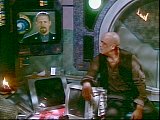- The militant telepaths made poor use of their talents in
combat. They appeared to rely on verbal communication. Granted, none
of them had military training (or at least, it wasn't stated) but for
a group whose stated purpose was being able to make free, unrestrained
use of their telepathic abilities, it's odd that they didn't do so
when it would have been of some tactical advantage.
- Were all the militant telepaths really killed? Sheridan
had only Byron's statement that the identicards and confessions
represented all the militants. Byron didn't have any reason to want
to lie, but was he able to extract confessions from all the parties
responsible for the violence? All the confessions and cards were
probably those of violent telepaths, but Sheridan had no way of knowing
that it was a complete set, despite Byron's promise that Sheridan would
have everything he needed to be sure.
- Bester had more than one reason for wanting to take the
telepaths alive. Had he gained custody over them, he might well have
been able to extract whatever information they gained from the alien
ambassadors. He would also have discovered the information Lyta
broadcast to the group while making love to Byron in
"Secrets of the Soul."
Of course, he might already know all about the Vorlons' actions by
other means, such as the Corps' previous association with the Shadows.
- The theme of suicide as redemption for past sins has
appeared before, most notably in
"Passing Through Gethsemane,"
in which Brother Edward allowed himself to be killed to atone for his
murderous past. Byron's self-immolation had a different twist, though:
after he killed Thomas, he may have come to believe that the noble
lifestyle he wanted was an impossible dream. Edward, though no
choice of his own, had given up his past tendencies but
still came to believe he needed to die to atone for them.
Byron's personality shift after being asked to fire on an innocent
vessel also echoes David McIntyre's transformation into Arthur in
"A Late Delivery from Avalon."
- Byron's experience with Bester echoed Lyta's experience
with the Psi Cops: she was made to do something traumatic (in her
case, helping to plant images in a murderer's mind to drive him
insane, as she described in
"The Face of the Enemy")
and decided that she had to leave the Psi Cops. She left by
transferring to another division of the Corps rather than running
away entirely, but the similarity of experience begs the question of
how many other former employees of the Psi Cops have left
under similar circumstances.
- Why didn't Lyta already know Byron's secret? If Talia's
description is to be believed
("Mind War")
lovemaking between telepaths involves dropping all defenses and diving
deeper and deeper into each other's minds. Given how central Byron's
experiences in the Corps were to his personality, and that, by his own
admission, he hadn't hidden his past from other members of the group,
why wouldn't Lyta have come across his memories while they were
together?
It's possible that Lyta was so much more powerful than Byron that her
memories drowned his out; she did warn him that the experience might
be overwhelming.
- If Lyta does take Byron's place and become a champion
of rogue telepaths, she may be vulnerable to blackmail by Bester. In
"Epiphanies,"
he claimed to know secrets about her that she wouldn't want revealed.
Whatever those secrets are, they may still hold some sway over her.
On the other hand, Lyta implied she'd received secrets from Byron, so
she may be able to counter-blackmail Bester just as easily.
- Bester claimed that all races dealt with telepaths
through laws, religion, or extermination. That contradicts Garibaldi's
assertion in
"The Paragon of Animals"
that Centauri telepaths "can do whatever they want." The Minbari
treatment of telepaths
("Legacies")
might arguably be religious, but it's really more cultural: telepaths
are treated with respect and are expected to devote themselves to
serving others. It's unclear how other races treat their telepaths,
though, so Bester might be right in most cases.
- What does the departure of the telepath colony do to
Garibaldi's plan to use some of its members as Alliance spies
("The Paragon of Animals?")
They only helped Garibaldi at Byron's behest, and with Byron gone,
it's not clear they'll feel any obligation to make good on the promise.
If Garibaldi does lose his telepathic spies, the whole exercise was
largely a waste of his time; the only piece of information he's
received from the telepaths was the warning about the Drazi fleet in
"Paragon,"
and that happened before he started spending time training operatives.
It's possible, in fact, that Garibaldi's training sessions will end
up working against him: if his two trainees were among the telepaths
who left the station, and they're working on their own now, their
training makes them more dangerous to everyone involved.
- Does Garibaldi's conditioning prevent him from revealing
its presence to people who might be in a position to either remove
it or take revenge on Bester for him? He appeared to be having some
difficulty asking Franklin about circumventing it. Could he, for
example, tell Lise about it? If not, how will he explain his return
to the bottle?
- Garibaldi's return to the bottle
might not be quite what it seems. It's possible that "alcohol" is the
answer to his question, "Are there any drugs that can suppress a
telepathic block?" In that case, Garibaldi faces a choice between
confronting his alcoholism once again and being powerless to take
revenge on Bester.
Using alcohol to nullify mind control has precedent: Londo used it to
evade his Keeper in
"War Without End part 2,"
and the Regent, also Keeper-encumbered, was said to have taken up
drinking in
"In the Kingdom of the Blind."
Alcohol only puts the Keepers to sleep, though; it doesn't actually
stop them from taking control while they're awake. So the precedent
is an imprecise one at best.
- While he was describing Asimov's Laws to Garibaldi, Bester
said that "pre-ban cyberneticists" on Earth had built them into their
machines. That implies that at one time, Earth had intelligent robots
or machines of some kind, but later decided to put an end to them.
Why? Was there a problem with the machines? What happened, and when?

